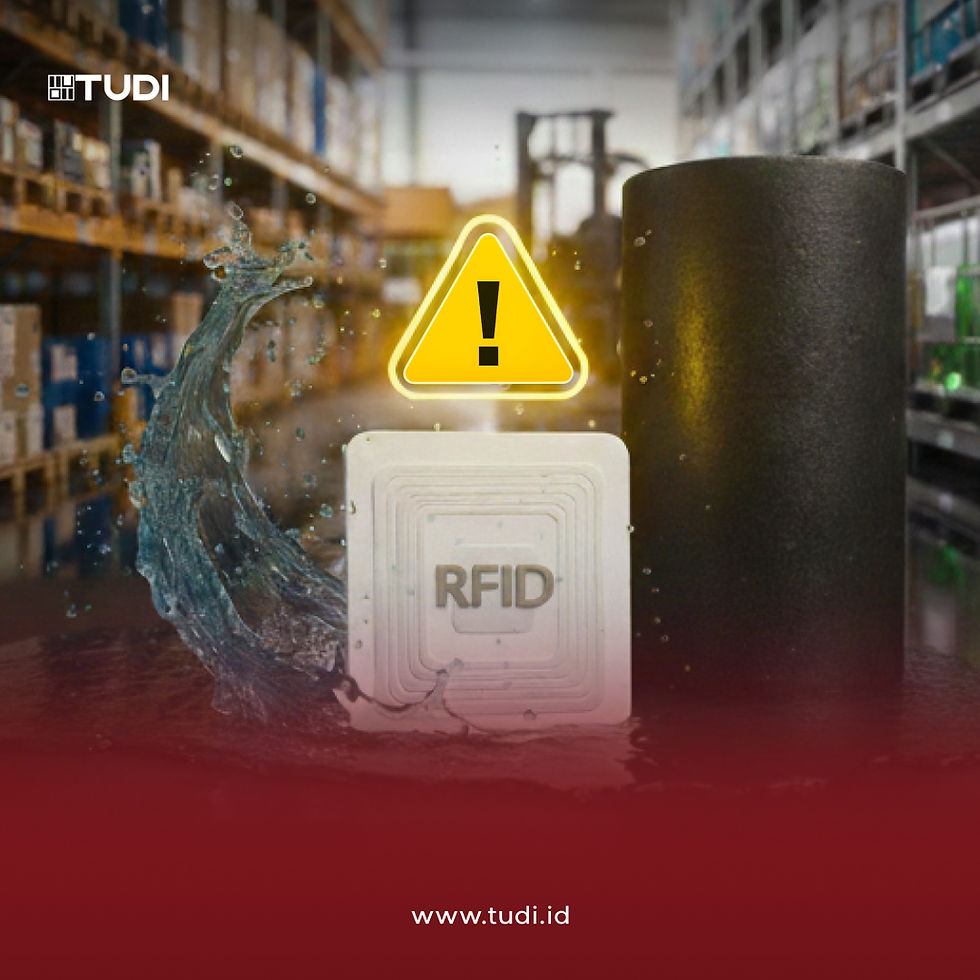RFID Scanner: Definition, How it Works, Types, and Applications
- Marketing Tudi
- Aug 21, 2025
- 4 min read

As technology advances, businesses increasingly need fast, accurate, and efficient tracking systems. One device that plays a crucial role is RFID Scanner This tool is often also called as RFID Reader, which reads data from RFID tags and forwards it to the management system. With this technology, companies can accelerate inventory, distribution, and asset control processes in real time.
Understanding RFID Scanner
RFID Scanner is an electronic device used to read information from RFID tag by utilizing radio waves. This term basically refers to a device also known as a RFID Reader, it's just that in everyday practice many people call it a "scanner" because its function is similar to the barcode scanner commonly used in retail.
Unlike barcode scanners, which require visual scanning of individual tags, RFID scanners operate without physical contact and can read multiple tags simultaneously. This makes them superior in supporting the needs of industries with large volumes of data and goods.
How RFID Scanners Work
Technically, RFID Scanner emits radio waves through antenna which is then captured by the chip on the RFID tag. The chip responds by transmitting stored data, which is then returned to the scanner for processing. This data is then fed into a management system, such as an ERP or WMS, for use as needed by the business.
This process is very fast and does not require a direct line of sight, so tags that are inside packaging or covered by certain materials can still be read as long as they are within signal range.
Type of RFID Scanner
There are several typesRFID Scannercommonly used according to business needs and operational environment:
1. Handheld Scanner (Portable)
It resembles a lightweight and flexible handheld device. This device is typically used by warehouse staff, retail staff, or field officers to quickly conduct asset inventories. Its advantage is its high mobility, allowing it to be carried to various locations, even in areas with limited access.
2. Desktop / Countertop Scanner
These devices are installed on work desks or service counters. They're typically used for check-in and check-out, such as in libraries, hospitals, or retail checkouts. Their advantages include ease of use and a practical design, although their reading range is limited compared to other types.
3. Fixed / Integrated Scanner
This type is permanently installed at warehouse entrances, production lines, or logistics conveyors. The scanner automatically reads passing tags without human intervention. It's suitable for large-scale operations requiring high speed and accuracy, such as logistics, manufacturing, and transportation.
Advantages of RFID Scanner
Here are some of the main advantages of RFID Scanners that make them superior to conventional methods such as barcode scanners:
1. Fast and Mass Reading
RFID scanners can read dozens to hundreds of tags simultaneously, unlike barcode scanners, which can only read one at a time. This is especially helpful in large warehouses or high-volume distribution channels.
2. No Physical Contact Required
RFID tags can still be read even when covered in plastic, cardboard, or even hidden inside a box. This eliminates the barriers often encountered with barcode methods.
3. Higher Data Accuracy
With a chip that stores unique information, RFID scanners minimize manual input errors. Data is recorded directly into the system, reducing the risk of human error.
4. Flexible in Use
These devices are available in various forms, ranging from handheld scanners for high mobility, to fixed scanners installed at entrances or conveyors.
5. Operational Efficiency
The combination of speed, accuracy, and flexibility makes RFID Scanner a tool that can reduce time, increase productivity, and maintain supply chain visibility.
Disadvantages of RFID Scanners
Although it offers many benefits, the use of RFID Scanners also has a number of limitations that need to be considered before implementation:
1. Higher Implementation Costs
Compared to cheap and practical barcode scanners, RFID scanners require more expensive hardware and tag investments.
2. Potential Signal Interference
Environments with a lot of metal, liquids, or electromagnetic interference can affect the quality of the reading.
3. Need Additional Infrastructure
To optimize its functionality, RFID scanners typically require additional infrastructure, such as integrating RFID with management software such as ERP or WMS. Without integration, their added value is not maximized.
RFID Scanner Applications in Various Industries
With the flexibility and speed offered, RFID Scanners can be applied in various industries to meet the specific needs of each sector, such as the following:
1. Retail and Distribution
Speed up the inventory process, reduce out-of-stock, and improve the customer experience with a faster checkout system.
2. Manufacturing
Track raw materials and finished goods along the production line, thereby minimizing errors and improving quality control.
3. Logistics and Warehousing
Assists in the inbound and outbound goods process, speeds up loading/unloading, and improves the accuracy of warehouse stock data.
4. Healthcare
Ensuring the availability of medical devices, tracking medications, and maintaining the security of patient data with automated identification processes.
5. Transportation
Used for electronic ticket management, baggage tracking, and practical and efficient automatic toll systems.
Conclusion
RFID scanners have become a crucial tool in modern business automation. With the ability to read data quickly, accurately, and without physical contact, this technology offers efficiencies far exceeding traditional methods like barcode scanners.
As an end-to-end RFID solutions provider, TUDI offers a variety of RFID scanner options tailored to the scale and operational needs of your company. Whether for warehouse management, retail, or large-scale industries, each device is supported by the DERAS Protocol, enabling seamless integration in just 3–5 days. This makes RFID implementation more practical, faster, and minimizes technical hurdles.
Consult your RFID needs with a team of experts TUDI and find the best solutions that not only increase productivity, but also maintain the accuracy, efficiency, and competitiveness of your business in the fast-paced digital era.




